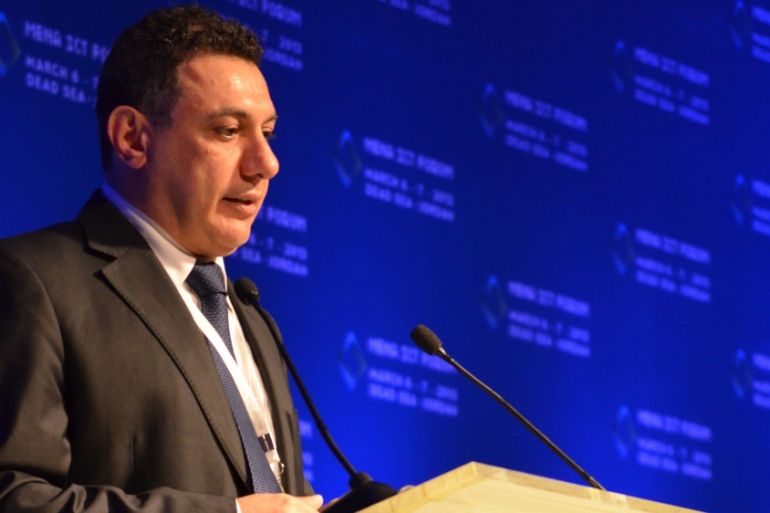Lebanese man with US residency held in Iran to go home on Tuesday
IT specialist Nizar Zakka vanished in Iran in 2015 after being invited to attend a summit there by a state official.

A Lebanese citizen with US residency detained in Iran since 2015 is expected to return to Lebanon on Tuesday, according to the government in Beirut.
Lebanon’s internal security head, Major General Abbas Ibrahim, travelled to Tehran on Sunday to oversee Nizar Zakka’s release on behalf of President Michel Aoun.
In a post on its official Twitter account, Lebanon’s Directorate of General Security shared two black and white images of Zakka, who is seen shaking hands with Ibrahim after a meeting on Monday night.
In a short statement, it said Ibrahim would return with Zakka to Lebanon “tomorrow”.
واصل المدير العام للأمن العام #اللواء_عباس_ابراهيم اتصالاته مع المسؤولين في طهران موفدا من قبل رئيس الجمهورية العماد ميشال عون. وقد التقى باللبناني نزار زكا على ان تستكمل الاتصالات حتى يوم غد للعودة الى لبنان. pic.twitter.com/Y7TJDdNLgH
— الأمن العام اللبناني (@DGSG_Security) June 10, 2019
Zakka’s release had been anticipated since last week.
Lebanese officials previously urged Tehran to grant an amnesty to Zakka, who was sentenced in 2016 to 10 years in prison and a $4.2m fine for “collaborating against the state”.
Earlier on Monday, Iran’s semi-official Fars news agency, citing an unnamed source, said Zakka would be handed over to Hezbollah, a popular Shia group which is represented in the Lebanese parliament and has a powerful armed wing.
“The move will take place in the next few hours. This is done solely because of the respect for and dignity of [Hezbollah leader] Hassan Nasrallah,” the source told Fars.
Zakka, an information technology specialist with permanent residency in the United States, leads the Arab ICT Organization, or IJMA3, an industry consortium from 13 countries that advocates for information technology in the region.
He vanished in Iran in 2015 after being invited by a government official to attend a conference there. Iranian media said later he had been detained by Iran’s elite Islamic Revolutionary Guard Corps for alleged ties to US security services.
State media reported in 2017 that he had lost an appeal against his conviction. The US State Department had in 2016 called for his release, saying he was unjustly held.
In April this year, Iranian Foreign Minister Mohammad Javad Zarif told Reuters News Agency he was proposing “a serious dialogue” with the US on a possible prisoner swap, though he did not say whether Zakka might be included.
Iran ‘failed’ to help
In 2016, The Associated Press news agency reported that Zakka’s supporters wrote to then-Secretary of State John Kerry stating that Zakka had travelled to Iran “with the knowledge and approval of the US State Department, and his trip was funded by grants” from it.
Zakka’s IJMA3 organisation had received at least $730,000 in contracts and grants since 2009 from both the State Department and the United States Agency for International Development.
The State Department has yet to respond to a years-old request from the AP for information about those grants.
Shahindokht Molaverdi, an adviser to Iranian President Hassan Rouhani who as a vice president invited Zakka to Iran, told the AP in September that Iran’s government had “failed” to help Zakka.
“This is in no way approved by the government,” Molaverdi said. “We did all we could to stop this from happening, but we are seeing that we have failed to make a significant impact.”
Iran says a number of its nationals are being held unjustly in the West, including at least 56 in the US, and has asked for their immediate release.
A year after a 2015 landmark nuclear deal between Iran and major powers ushered in a wary thaw between the US and Tehran, Iranian authorities freed five US citizens in a prisoner exchange. But US-Iranian tensions have risen anew since Washington pulled out of the nuclear agreement in 2018.